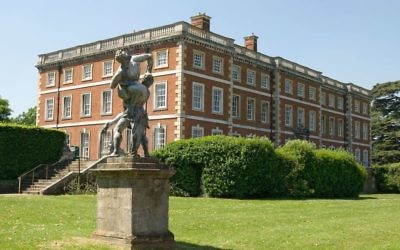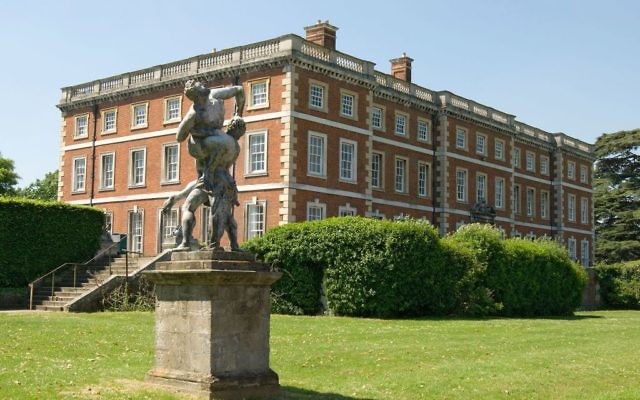Trent Park: WW2 spy centre ‘needs more Holocaust museum space’
Campaigners say property developer offering 'pitiful' space for museum to showcase how Brits learnt about Shoah
Campaigners fighting for a museum for Holocaust education at Trent Park to honour the site’s secretive role in winning WW2 and uncovering Nazi atrocities have blasted the developer’s “pitiful” offer of space.
Alongside Bletchley Park, the north London mansion helped British spies win the intelligence war, housing high-ranking German officials and gathering vital evidence – including of Nazis’ mass killing of Jews.
After a showdown public meeting last week, historians warned that inadequate space would rob future generations of a unique opportunity to learn about how the horrors of the Holocaust came to the attention of Britain.
Author Dr Helen Fry said: “We must give the Trent Park Museum the full space that it needs… You can’t tell the story properly with a couple of broom cupboards next to a café. We want at least one room on the significant discoveries of the Holocaust.”
Berkeley Homes, the new owner of the former Middlesex University Campus site, want most of it for luxury housing, developed over 45,000sq metres (52 acres). The company is offering 500sq metres for “ancillary uses”.
Fry, together with campaign director Jason Charalambous and historian Damian Collins MP, are demanding half the stable block, and the whole of the ground floor and basement of the mansion house “as an absolute minimum”.
Berkeley’s chairman Tony Pidgley said the company “has a great track record of developing sites of historic significance in a sensitive manner,” but Charalambous said the offer was “a pitiful amount that does not do justice to the estate’s significant national history”.
The campaigners’ argument was supported by Iain Standen, the chief executive of Bletchley Park, where Alan Turing and his team famously broke the Enigma code to turn the war effort in the Allies favour.
Bletchley now sees 250,000 visitors annually, and Standen said Trent Park also had the potential to become a significant national attraction, because it “has a unique and engaging story, which means people will come to visit”.
A petition for the museum, which had attracted almost 1,500 signatures this week, notes that Trent Park used “highly sophisticated room-bugging, eavesdropping and passive manipulation techniques,” on the dozens of high-ranking Nazis housed there.

After documents were declassified in 2004, historians discovered that the precursor to MI6 operating at the site learned about German U-boat tactics, radar technology and Hitler’s secret weapons programme, including the V1, V2 and atomic bombs.
Crucially, they also began hearing more details about the mass killing of Jews, as German generals casually discussed it without realising they were being recorded.
Fry said: “We began hearing about Nazi atrocities at Trent Park in 1940, at every stage, leading up to the Final Solution. They were detailing things like mobile gas trucks. By 1943 they Germans were already talking about 3.5 million Jews killed. Future generations should be able to come here and learn about this. It’s really important to do it justice.”
The Berkeley Group said: “Our vision for the site has been shaped by an extensive consultation process, and is driven by our goal to secure a long term legacy for the site. We will continue to work with the campaign.”

Thank you for helping to make Jewish News the leading source of news and opinion for the UK Jewish community. Today we're asking for your invaluable help to continue putting our community first in everything we do.
For as little as £5 a month you can help sustain the vital work we do in celebrating and standing up for Jewish life in Britain.
Jewish News holds our community together and keeps us connected. Like a synagogue, it’s where people turn to feel part of something bigger. It also proudly shows the rest of Britain the vibrancy and rich culture of modern Jewish life.
You can make a quick and easy one-off or monthly contribution of £5, £10, £20 or any other sum you’re comfortable with.
100% of your donation will help us continue celebrating our community, in all its dynamic diversity...
Engaging
Being a community platform means so much more than producing a newspaper and website. One of our proudest roles is media partnering with our invaluable charities to amplify the outstanding work they do to help us all.
Celebrating
There’s no shortage of oys in the world but Jewish News takes every opportunity to celebrate the joys too, through projects like Night of Heroes, 40 Under 40 and other compelling countdowns that make the community kvell with pride.
Pioneering
In the first collaboration between media outlets from different faiths, Jewish News worked with British Muslim TV and Church Times to produce a list of young activists leading the way on interfaith understanding.
Campaigning
Royal Mail issued a stamp honouring Holocaust hero Sir Nicholas Winton after a Jewish News campaign attracted more than 100,000 backers. Jewish Newsalso produces special editions of the paper highlighting pressing issues including mental health and Holocaust remembrance.
Easy access
In an age when news is readily accessible, Jewish News provides high-quality content free online and offline, removing any financial barriers to connecting people.
Voice of our community to wider society
The Jewish News team regularly appears on TV, radio and on the pages of the national press to comment on stories about the Jewish community. Easy access to the paper on the streets of London also means Jewish News provides an invaluable window into the community for the country at large.
We hope you agree all this is worth preserving.






















